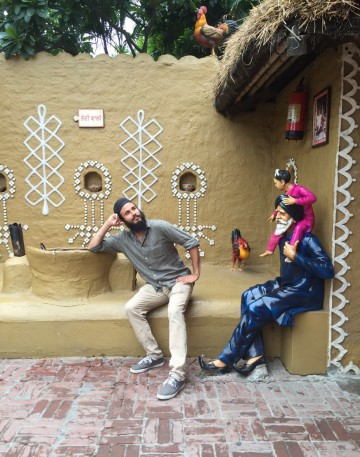 Bio: Rishi Khalsa is a graduate student in the Masters of Development Practice program at the University of California, Berkeley. Rishi is a recipient of the Graduate Opportunity Program scholarship and the Critical Language Scholarship for the study of Punjabi. He was also Peace Corps volunteer in Costa Rica where he worked at both the national and local level with the Ministry of Public Education. He received his Bachelor’s in Economics, International Studies, and Spanish at California State University, East Bay.
Bio: Rishi Khalsa is a graduate student in the Masters of Development Practice program at the University of California, Berkeley. Rishi is a recipient of the Graduate Opportunity Program scholarship and the Critical Language Scholarship for the study of Punjabi. He was also Peace Corps volunteer in Costa Rica where he worked at both the national and local level with the Ministry of Public Education. He received his Bachelor’s in Economics, International Studies, and Spanish at California State University, East Bay.
SikhNet recently interviewed Rishi Khalsa. Harijot Singh (SikhNet) actually had a vision about doing on the ground live reporting in the Punjab, in English. This would be to elevate the plight of the Punjab, especially in situations like what we experienced at the end of last year and with Bapu Surat for example, elevate these things into the international spotlight. A lot of the problems in the Punjab are well known to the punjabis but not so well known to the rest of the world.
SN: Rishi Khalsa I understand that you went to high-school in India. Is that where you gained an interest in the Punjab?
That’s correct. I went to boarding school at Miri Piri Academy near Amritsar for roughly eight years starting when I was about eight years old. I would spend the school year in India and come back home to California each summer. Punjab has played a major role in forming who I am as a person and I’ve always wanted to be able to further develop that personal connection. Fortunately, through my current work with Global Press Institute, I have been able to find a way to do that and also try to have a positive impact on the region.
SN: What kind of further education did you get after going to school in India?
After high school I went to California State University, East Bay and graduated with degrees in International Studies, Economics, and Spanish. It was actually as an editor for the student newspaper, The Pioneer, at CSU East Bay that I met the founder of Global Press Institute, Cristi Hegranes, who was the faculty advisor for the paper at the time. I am currently pursuing a Masters in Development Practice at the University of California, Berkeley.
SN: Tell us about the project you are working on.
I am currently working with a non-governmental organization based in San Francisco called Global Press Institute. GPI is an organization that trains and employs women as journalists around the world to produce high - quality news and act as catalysts for social change. The journalists at GPI often cover issues that are overlooked by mainstream media or cover stories from a perspective that is infrequently found in international coverage. The aim of this questionnaire, and my current work on Punjab, is to provide GPI with some of the necessary information for opening an independent news desk in Punjab that would be fully operated by female journalists.
SN: Why do you think journalism is so important? Do you know of any examples where this kind of journalism has made a change?
At its core, I think journalism is important, particularly in democratic societies, because it can act as an accountability mechanism for public figures and processes that affect everyone. In my opinion, one of the reasons GPI’s work is important is because it works to make sure that more people are included in developing that accountability mechanism. The organization has been in operation for more than 10 years and, in that time, they have shown how their brand of journalism can make a difference. For example, in Zambia, the government in the capital city, Lusaka, changed waste collection practices after a GPI report. GPI’s reporting also helped reunite a woman with her grandchild in the aftermath of Argentina’s military dictatorship after 37 years of searching. I would encourage people to go to Global Press Journal and read some of the stories for themselves to find out more.
SN: Do you have anything else you would like to add?
 |
 |
I would just like to add that I think this work is particularly important for Punjab because there are still many gender disparities that negatively impact women and Punjabi society overall. Punjab has one of the world’s lowest female labor force participation rates at roughly 10%. In fact, according to some estimates, India overall could see an increase of $2.9 trillion to its economy by 2025 if it is able to completely close the gender gap. In Chandigarh, Punjab’s capital, there are roughly 800 women for every 1000 men, which is far below India’s average. So, in the hopes of contributing to the development of Punjab, please take the time to fill out this brief questionnaire! Link given below:
http://goo.gl/forms/ZsJODNQPvgETkgQx2
SN: Thank you for your time Rishi. I hope the project becomes a success. This is certainly an important topic.
